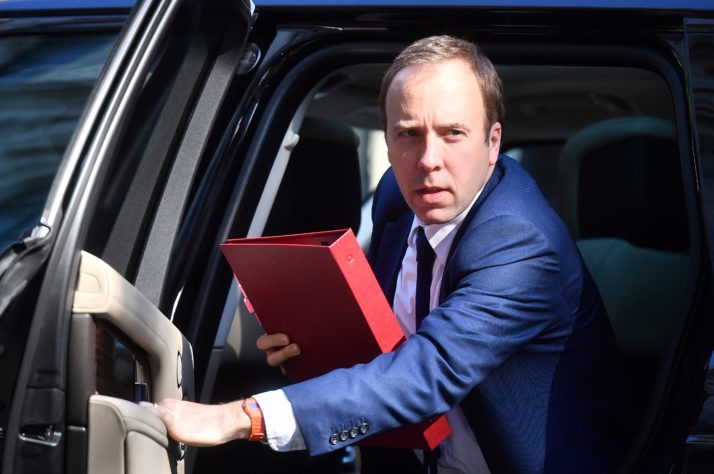LONDON — Boris Johnson wants to steal the U.K.’s National Health Service from Labour.
Armed with his 80-seat majority, the prime minister is planning the biggest shake-up of the country’s widely loved and politically potent health system in decades. He wants to persuade voters that the Conservatives can be trusted to look after what many regard as a national treasure.
In his victory speech Friday, Johnson said that the NHS will be the No. 1 priority for his government after Brexit. The scale of Johnson’s victory means Tories could make big changes to the system, at least in England — health care in Scotland and Northern Ireland is devolved to the local administrations.
If he succeeds, he could co-opt an issue that has traditionally been an Achilles’ heel for the Tories.
“We need a long-term plan for the whole of health and social care which is bold, and confident and ambitious,” said Health Secretary Matt Hancock in a speech Wednesday. “And when we look back in 2030 to this moment, this once in a generation opportunity, where a political commitment and the financial resources are in perfect alignment with the overwhelming public mandate, I want us to be able to say ‘yes, we got it right.’”
No free lunch
The U.K. is one of a few European countries where people have no out-of-pocket costs for treatment, whether urgent or non-urgent. If you need health care, you can walk into a hospital, or be taken by free ambulance, and get it — no need for insurance and (by and large) no payments. The state covers the bill.
The service was created in the aftermath of World War II by the Labour government of Clement Attlee. Since then, voters have mostly trusted Labour to keep the NHS publicly owned and free at the point of use. By contrast, the Conservatives have struggled to overcome suspicions that they want to privatize it or open it up to U.S. private health giants after Brexit.
Johnson’s bold campaign promise to build 40 new hospitals over the next decade was met with skepticism when it emerged that 34 of those projects have so far been pledged just £100 million of “seed funding.”
The underlying challenge: The NHS itself is far from being in rude health. Under increasing pressure from the U.K.’s aging population, costs are spiraling and the service is creaking. According to data published the day after the election, the NHS is performing at its worst ever, missing key waiting-time targets for accident and emergency care, operations and cancer treatment.
That poor performance gave it center stage in the election, with the state of the NHS overtaking Brexit as the most important issue during the campaign. According to an Ipsos MORI poll, 60 percent of voters cited the NHS when asked which issues would help decide their vote.
“You need to fix public health, social care, workforce and capital funding in order to get an uplift in performance“ — Richard Sloggett, analyst
Despite Labour’s efforts to pin the blame for the increasingly stretched service on nine years of Conservative rule, Johnson’s party emerged the winner.
Now the Tories’ aim is to permanently neutralize it as a losing issue.
Alongside a promise to spend an additional £33.9 billion on the NHS by 2023-24, No. 10 is determined to keep a closer eye on how the health service is managed, with a view to reverse the dismal performance statistics that so often make headlines, according to two officials with knowledge of the plans.
To signal its determination, the government said this week it will introduce a bill enshrining Johnson’s funding pledge immediately after Christmas. It has also pledged to reintroduce bursaries for nursing students — scrapped by the Conservative government in 2016.
A path ahead
The bill is also expected to change what has been the philosophy of the NHS since the early 2000s: that greater competition and choice are the drivers of quality improvement.
Instead, according to a former government official, No. 10 is pondering a transition toward a more collaborative approach, which could make it easier for NHS mergers and acquisitions involving NHS foundation trusts — semi-autonomous units that run health care services within the system — to go ahead.
The bill is expected to go through parliament very quickly, in the first three months of 2020. But many of the government’s plans will take longer than the five years of the next parliament to materialize.
Hancock said No. 10’s plan will focus on retaining and increasing NHS staff; boosting preventive medicine; deploying more technology; automating processes; and placing a strong emphasis on infrastructure upgrades while simplifying the approval process for capital investments so projects can start sooner.

Britain’s Health Secretary Matt Hancock | Daniel Leal-Olivas/AFP via Getty Images
The overall policy direction will continue to be dictated by the policy roadmap outlined in the NHS 10-year Plan, published by Prime Minister Theresa May in January, which sets out priorities and targets for health care over the next decade, including cancer, heart disease, diabetes, respiratory disease and mental health.
“The NHS is not an island,” said Richard Sloggett, health and social care lead at the Policy Exchange think tank. “You need to fix public health, social care, workforce and capital funding in order to get an uplift in performance.“
“More money going through the NHS on a revenue basis in year would only plug the gaps, it won’t do longer-term transformations,” he added. “A more systemic solution is probably something the government would need to look at during the course of this parliament.”
Brave new world?
The Conservatives also have some more radical ideas in mind. Better use of data and genomics — understanding patients’ genetic make up — are also likely to feature strongly in the government’s plans.
Dominic Cummings, the prime minister’s chief adviser and the head of the Vote Leave campaign in the 2016 Brexit referendum is — according to the two officials — behind the announcement of a new NHS Artificial Intelligence Lab, funded with £250 million, to promote the use of data-driven technology in health care.
At present, most examples of AI projects on health care are still proofs of concept, but in blogposts published earlier this year, Cummings argued there’s an opportunity for the U.K. to lead on the use of AI and genomics to improve health outcomes.

Dominic Cummings, the prime minister’s chief adviser | Daniel Leal-Olivas/AFP via Getty Images
NHS X, a body set up in February, has been tasked with adopting technologies and applications that could speed up processes in hospitals and trusts. Its deputy chief executive, Simon Eccles, called the effort an attempt to remedy the fact that the “NHS has lagged behind other sectors like construction” when it comes to picking up technologies than can save staff time.
In his blog, Cummings has also backed the development of a free and universal genetic sequencing program in the NHS, looking at the million or so most informative markers or genetic variants, instead of sequencing people’s entire genome. He argues this type of program would initially cost $50 per person, rather than the $1,000 per person it would require to sequence somebody’s whole genome.
“At the moment the genomics agenda is much more in the clinical space than in the population health space,” said Sloggett. “But there could be some policy movements on that population health space in the coming five years because there are now emerging data platforms in the NHS to do it.“
„Britain can choose to be a backwater, to ignore such things and listen to MPs telling fairy stories while the Chinese plough ahead, or it can try to lead“ — Dominic Cummings, top No. 10 adviser
„It is immensely challenging, and you need to get the governance, security and interoperability right, but it has the potential for delivering more preventive health systems which has to be the overall ambition,“ he added.
Whitehall will also pay increased attention to scientific research. Plans for a new funding agency for high-risk R&D projects are well-advanced, and an announcement could be made in the annual budget in March. Under plans outlined in the Conservative manifesto, the agency, one of Cummings’ pet projects, will spend £800 million over the next five years, with part of this money potentially addressing health challenges.
“China is pushing very hard on genomics/AI and regards such fields as crucial strategic ground for its struggle for supremacy with America,” Cummings wrote in February. “America has political and regulatory barriers holding it back on genomics that are much weaker here.“
„Britain cannot stop the development of such science,“ he added. „Britain can choose to be a backwater, to ignore such things and listen to MPs telling fairy stories while the Chinese plough ahead, or it can try to lead. We will never be the most important manufacturing nation again but we could lead in crucial sub-fields of advanced technology.”
Want more analysis from POLITICO? POLITICO Pro is our premium intelligence service for professionals. From financial services to trade, technology, cybersecurity and more, Pro delivers real time intelligence, deep insight and breaking scoops you need to keep one step ahead. Email pro@politico.eu to request a complimentary trial.
Source: politico.com
See more here: news365.stream






